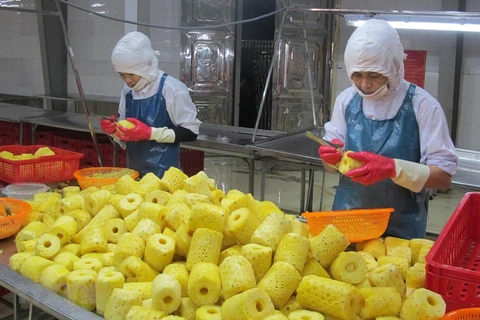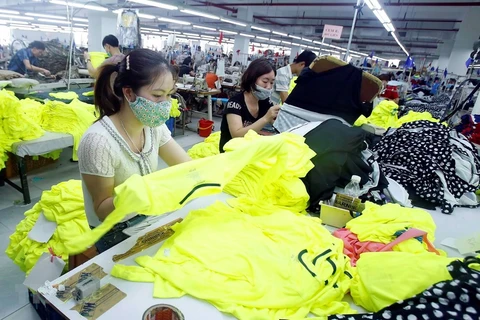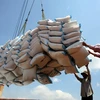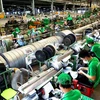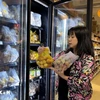Hanoi (VNA) - The COVID-19 pandemic has seriously affected Vietnam's trading activities. By the end of the first quarter of 2020, the nation’s exports increased only by 0.5%.
Notably, the export of key items fell or increased slightly compared to the same period last year.
According to the Ministry of Industry and Trade, exports in March were estimated at 20 billion USD, down 4.1% from the previous month.
The average export turnover of the first quarter reached 59.1 billion USD, an increase of only 0.5% compared to the same period in 2019 and also the lowest Q1 export growth since 2003.
Exports of agro, forestry and aquatic products in the first 3 months dropped by 8.3% to 5.28 billion USD. In which, vegetables and fruits decreased by 11.5 percent, seafood by 11.2 percent and rubber by 26.1 percent.
"The COVID-19 epidemic affects export activity, especially the Chinese market, causing export turnover to this market to decline sharply; exports to the EU, ASEAN, and the Republic of Korea also went down,” reported the Vietnam Association of Seafood Exporters and Producers (VASEP).
Processing industry, which contributed more than 80 percent to the country’s total export turnover, only brought home 50.05 billion USD, up 1.7% compared to the same period last year.
Despite the impact of the pandemic, exports to China still increased by 11.5 percent, Japan by 3.5 percent in the first quarter.
Meanwhile, the country's import turnover of goods also showed signs of decline.
"Due to export slowdown, Vietnam's import of goods in the first quarter of 2020 decreased by 1.9 percent compared to the same period last year, estimated at 56.26 billion USD," said a representative of the Ministry of Industry and Trade.
Import turnover of domestic enterprises and FDI enterprises decreased by 3.4 percent and 0.8 percent, respectively compared to the same period in 2019.
Due to the COVID-19 epidemics, consumption in many countries plummeted.
Cao Huu Hieu, Deputy General Director of Vietnam National Textile and Garment Group (Vinatex), said although some enterprises have signed export orders until the end of the second quarter, many businesses are facing difficulties because importers ask for price reduction.
Meanwhile, Nguyen Van Phuong, Deputy Director of Bac Giang Department of Industry and Trade, said the COVID-19 epidemic is predicted to cause difficulties in agricultural-forestry-fishery products export.
He proposed the Ministry of Industry and Trade help connect localities to push product consumption, especially local typical products and specialties, such as lychee fruits.
Do Xuan Lap, Chairman of the Vietnam Timber and Forest Products Association, proposed to the National Assembly and Government consider refund of value added tax to eligible exporters while extempting duty for timber products imported from countries, such as the EU, United States, Canada, Japan, etc. and exempting and extending VAT payment for exported woodchips.
Amid the outbreaks, the Ministry of Industry and Trade has proposed solutions to remove difficulties and stabilize production and business activities.
Minister Tran Tuan Anh asked the Ministry’s departments to work with associations and businesses to assess the COVID-19 impact on economic production activities, thus developing support policies for businesses.
He also asked the Department of Industry to review and report on the situation, the demand for input materials, propose production organization plans and solutions to diversify and ensure raw materials for production and business while accelerating implementation of key industrial projects to contribute to the economy growth.
"From now on, it is necessary to focus on restructuring the connection chains to serve the industrial production, especially some of our major manufacturing and processing industries such as textiles, footwear, electronics and furniture. timber... in a more sustainable way with some partners such as the Republic of Korea, Japan, India, thus avoiding dependence on one or a few partners or markets," the Minister noted./.



